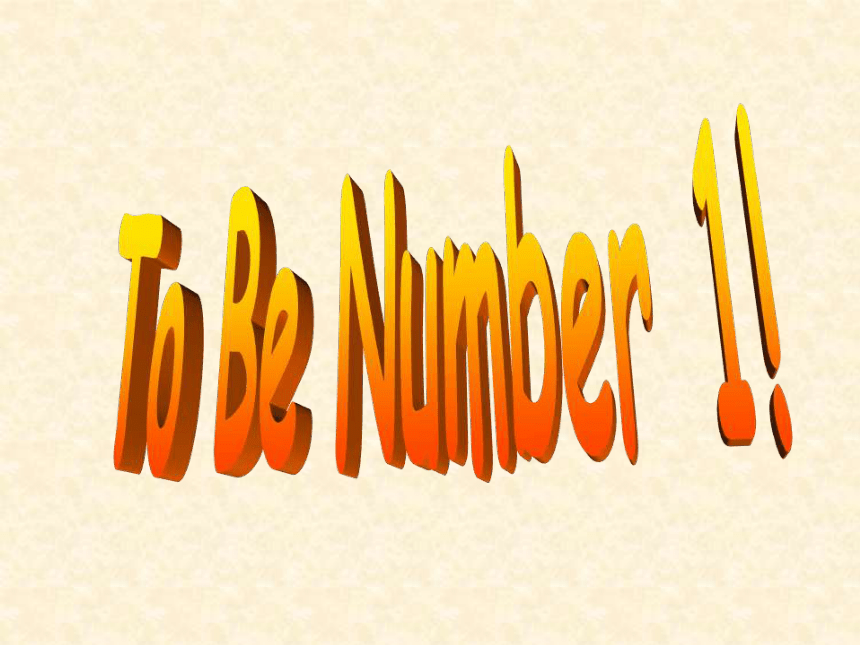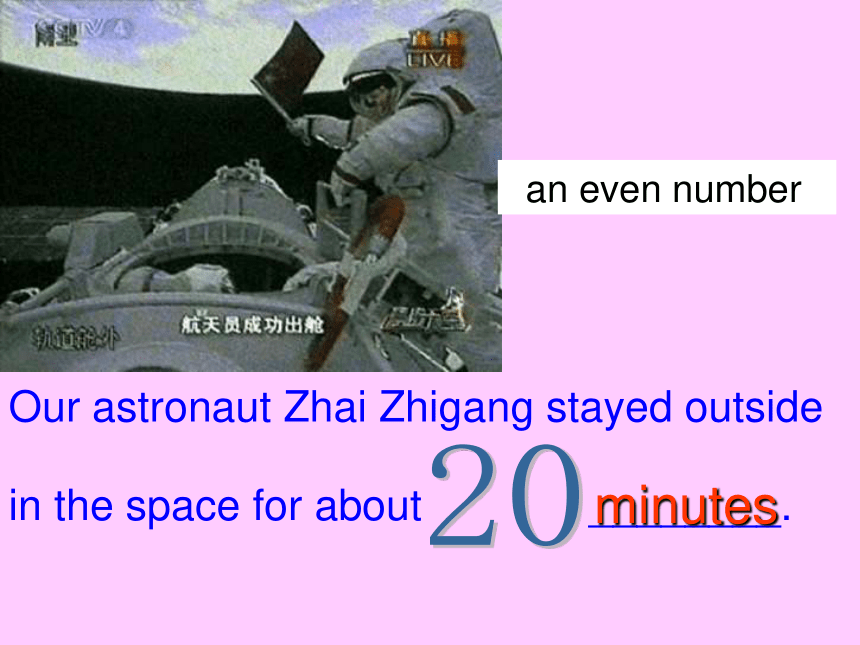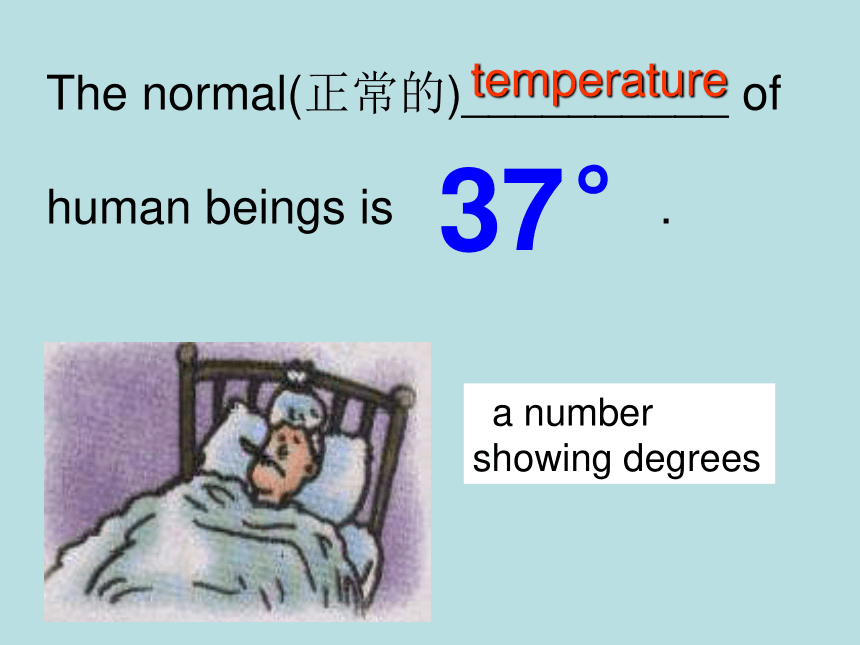Module 2 Amazing things Unit 4 Numbers课件
文档属性
| 名称 | Module 2 Amazing things Unit 4 Numbers课件 |

|
|
| 格式 | zip | ||
| 文件大小 | 4.5MB | ||
| 资源类型 | 教案 | ||
| 版本资源 | 牛津上海版(试用本) | ||
| 科目 | 英语 | ||
| 更新时间 | 2017-09-09 00:00:00 | ||
图片预览









文档简介
课件24张PPT。NumbersTo Be Number 1!2.26Yao Ming is
meters _____. tall a decimal number3
4About of the surface of
the Earth is _______ with water.covered a fractionThe maglev train can run at the
speed of ________ an hour.kilometers431 an odd number20Our astronaut Zhai Zhigang stayed outside
in the space for about ________.minutes an even number About of your body consists of ______. 70%water a percentageThe normal(正常的)__________ of human beings is . 37°temperature a number showing degrees Numbers: Everyone’s language How many languages do you know? Everyone knows at least two -----his or her own language and the international language of numbers. Chinese
EgyptianAncient numbers
ZeroRoman
GreekT or F
Everyone knows at least 2 languages.
Long ago, there were different ways of writing numbers.
The zero is not a number.
The zero is an especially(=very) important number.
The zero was invented earlier than 1-9.
TFTTF The zero is a number. The zero was invented later than 1-9.Ancient numbersdifferentthe samewrote… in many
different wayscounted… in
the same way 1. A: Everyone knows it.
B: Knows what?
A: The ________of _______.
2. A: Long ago, people wrote them in many
different ways.
B: Wrote what?
A: _________ .
3. A: People all count in this way.
B: In what way?
A: ________ ________.
languge numbers Pair workNumbers In tens Pair workModern 1 2 3 4 5 6 7 8 9 10ChineseEgyptianRoman Ⅰ Ⅱ Ⅲ Ⅳ Ⅴ Ⅵ Ⅶ Ⅷ Ⅸ ⅩGreek α β γ δ ε ? ζ η θ ιIndian01.How many numbers do the system of numbers consist of? What are they?
2.What can we do with …….?
3. Who invented ……?
4.Why ……?
10. We can write any number from the biggest to the smallest. The Indians.Because it made it easier to write big numbers and to calculate.They are 1-9 and 0.Ask and answer questions The history of numbers
Everyone knows at least two languages ——his or her own language and numbers, which are international.
In ancient times, people wrote numbers in different ways, but they all counted in the the same way ——in tens.
The system of numbers consists of 10 numbers. They are 1-9 and 0. Among them, zero is especially important. The Indians invented it. It’s a very important number because it makes it easier to write big numbers and to calculate.
The history of numbers
Everyone knows at least two languages ——his or her own language and numbers, which are international.
In ancient times, people wrote numbers in different ways, but they all counted in the the same way ——in tens.
The system of numbers consists of 10 numbers. They are 1-9 and 0. Among them, zero is especially important. The Indians invented it. It’s a very important number because it makes it easier to write big numbers and to calculate.
The history of numbers
Everyone knows at least two languages ——his or her own language and numbers, which are international.
In ancient times, people wrote numbers in different ways, but they all counted in the the same way ——in tens.
The system of numbers consists of 10 numbers. They are 1-9 and 0. Among them, zero is especially important. The Indians invented it. It’s a very important number because it makes it easier to write big numbers and to calculate.
Do you know…? Why do we count in tens?
Why are the numbers called Arabic numbers but not Indian numbers?
When and how did the Europeans start to use Arabic numbers?
Which was used first, fractions or decimal numbers?
Homework1. Read the passage and answer questions.
2. Write a summary of the history of numbers.
http://www.math.wichita.edu
http://http://www.historyforkids.org/
meters _____. tall a decimal number3
4About of the surface of
the Earth is _______ with water.covered a fractionThe maglev train can run at the
speed of ________ an hour.kilometers431 an odd number20Our astronaut Zhai Zhigang stayed outside
in the space for about ________.minutes an even number About of your body consists of ______. 70%water a percentageThe normal(正常的)__________ of human beings is . 37°temperature a number showing degrees Numbers: Everyone’s language How many languages do you know? Everyone knows at least two -----his or her own language and the international language of numbers. Chinese
EgyptianAncient numbers
ZeroRoman
GreekT or F
Everyone knows at least 2 languages.
Long ago, there were different ways of writing numbers.
The zero is not a number.
The zero is an especially(=very) important number.
The zero was invented earlier than 1-9.
TFTTF The zero is a number. The zero was invented later than 1-9.Ancient numbersdifferentthe samewrote… in many
different wayscounted… in
the same way 1. A: Everyone knows it.
B: Knows what?
A: The ________of _______.
2. A: Long ago, people wrote them in many
different ways.
B: Wrote what?
A: _________ .
3. A: People all count in this way.
B: In what way?
A: ________ ________.
languge numbers Pair workNumbers In tens Pair workModern 1 2 3 4 5 6 7 8 9 10ChineseEgyptianRoman Ⅰ Ⅱ Ⅲ Ⅳ Ⅴ Ⅵ Ⅶ Ⅷ Ⅸ ⅩGreek α β γ δ ε ? ζ η θ ιIndian01.How many numbers do the system of numbers consist of? What are they?
2.What can we do with …….?
3. Who invented ……?
4.Why ……?
10. We can write any number from the biggest to the smallest. The Indians.Because it made it easier to write big numbers and to calculate.They are 1-9 and 0.Ask and answer questions The history of numbers
Everyone knows at least two languages ——his or her own language and numbers, which are international.
In ancient times, people wrote numbers in different ways, but they all counted in the the same way ——in tens.
The system of numbers consists of 10 numbers. They are 1-9 and 0. Among them, zero is especially important. The Indians invented it. It’s a very important number because it makes it easier to write big numbers and to calculate.
The history of numbers
Everyone knows at least two languages ——his or her own language and numbers, which are international.
In ancient times, people wrote numbers in different ways, but they all counted in the the same way ——in tens.
The system of numbers consists of 10 numbers. They are 1-9 and 0. Among them, zero is especially important. The Indians invented it. It’s a very important number because it makes it easier to write big numbers and to calculate.
The history of numbers
Everyone knows at least two languages ——his or her own language and numbers, which are international.
In ancient times, people wrote numbers in different ways, but they all counted in the the same way ——in tens.
The system of numbers consists of 10 numbers. They are 1-9 and 0. Among them, zero is especially important. The Indians invented it. It’s a very important number because it makes it easier to write big numbers and to calculate.
Do you know…? Why do we count in tens?
Why are the numbers called Arabic numbers but not Indian numbers?
When and how did the Europeans start to use Arabic numbers?
Which was used first, fractions or decimal numbers?
Homework1. Read the passage and answer questions.
2. Write a summary of the history of numbers.
http://www.math.wichita.edu
http://http://www.historyforkids.org/
